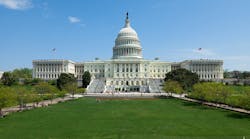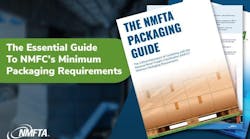How legislation favorable to trucking will fare during the upcoming 114th Congress will be predicated on more than the obvious expectation that business interests will be well-served by the GOP victories rolled up across the country in yesterday’s mid-term elections.
Voters put the Republican Party firmly in control of the U.S. Senate, expanded its GOP majority in the U.S. House of Representatives and increased its tally of governorships.
As of now, the Republicans have won seven more Senate seats (NC, AR, CO, IA, MT, SD, WV)— or one more than was needed to take charge of the upper chamber. The current tally: 52 R; 44 D; 2 I. Two races are yet to be decided (LA, AK), but even if both go GOP that won’t give the party the votes needed to break a filibuster.
Once all the votes are counted, the Republicans are expected to gain 10 more seats in the House— awarding the party its largest majority in he lower chamber since the 1940s.
At this writing, it is also expected that at least four more Republican governors (AR, IL, MY, MS) will take office. The current tally has Republicans in charge of 31 states and the Democrats of 15, with four races yet to be determined.
There were also transportation-related initiatives ballotted on in several states.
How smooth trucking’s road ahead will be on Capitol Hill will depend on how well the Republican leadership in both chambers rally their respective troops to press for legislative measures that can both be passed and not face vetoes by President Obama.
For starters, as is always the case when such a power turnover occurs, presumptive Senate Majority Leader Mitch McConnell (R-KY) will have to transition GOP Senators from acting in their familiar role as opposition politicians to governing as holders of the levers of power.
Complicating that task for Sen. McConnell and his leadership team will be the need to forge effective working partnerships between “mainstream” and “tea party” GOP senators before they can even hope to forge compromises with enough Democratic senators to pass controversial legislation—as neither party will have the 60 votes needed to break a filibuster.
The next Majority Leader has already hinted at what strategy he will pursue in the new term to bridge political divides. In his campaign, McConnell “balanced the tension” that exists between the “skeptical conservatives and more moderate voters in both parties” that have supported him over the years at the polls, pointed out the Wall Street Journal’s Washington Wire blog. “The Kentucky senator stressed his opposition to Mr. Obama and his policies, while highlighting the instances in which he worked with the White House to cut last-minute budget deals to keep the government running and shield most wage earners from a tax increase,” observed WSJ blogger Patrick O’Connor.
And given the shellacking his party took, President Obama will have no choice but to seek common ground with both Sen. McConnell and the newly strengthened Speaker of the House, Rep. John Boehner (R-OH). That’s if the President hopes to impact any meaningful legislation during his last two years in office.
At least one GOP lawmaker thinks it’s time for both parties to accept that compromises must be hashed out, according to a report by The New York Times. “You are going to have to have both parties give up more than they’d like to get less than they want,” said Rep. Tom Cole (R-OK). “It will be as much a test for the Republicans as the Democrats.”
The realms in which the White House and Congress could most likely compromise going forward include measures to reform corporate taxation, expand international trade, and—yes— invest in repairing and building roads and bridges.
That last agenda item, of course, will require the passage at long last of a comprehensive and multi-year highway bill if the type seen back before partisan brinkmanship gridlocked Washington.
Luckily for trucking and other transportation stakeholders, passing a truly impressive surface-transportation bill before funding dries up in May would certainly help demonstrate to the country that the Republicans holding Capitol Hill have what it takes to govern effectively.
On that front, specific election results bear mentioning. For starters, the Republican gains will reshape the House Transportation & Infrastructure (T&I) Committee. Several of its current members will be gone, having been defeated or retired, and the committee will seat more Republicans.
The most noticeable departure will be Ranking Member Rep. Nick Rahall (D-WV), who after 38 years in the House— and he sat that entire time on T&I-- lost to Republican Evan Jenkins. Rahall’s lost puts Rep. Peter DeFazio (D-OR) next in line for the committee’s top opposition slot. Once the next highway bill is in play, it will be up to DeFazio as Ranking Member to push for inclusion of measures favored by Democrats.
But DeFazio’s ascension is more than a changing of the guard, contend Politico.com transportation-policy bloggers Adam Snider and Heather Caygle: “Unlike Rahall, DeFazio represents a district that is safely Democratic and his priorities as ranking member could reflect that. He’s also been known to vocally clash with Republicans and won’t be shy if there are things he doesn’t like in a GOP-led transpo bill.”
DeFazio introduced a bill this year to repeal the federal fuel tax and make up the difference with a refinery-level oil tax, indexed to inflation, Snider and Caygle pointed out. The bloggers also suggested that possible GOP transportation-related initiatives might “pushing an expansion of oil and gas drilling to gin up transportation revenue.”
Members of both parties on Capitol Hill have previously indicated that they oppose hiking the federal fuel tax and that view will likely continue to prevail next year.
And then there’s the question of whether the mid-term results will impact trucking-related regulations. On the one hand, actions taken by GOP-controlled committees may be able to slow down the flow of new rules to some degree, but they cannot divert all the ones already making their way through the Obama’s Administration pipeline.
Lastly, GOP control of the Senate will require President Obama to think long and hard about which appointments he makes going forward, including who he may name as the next chief of the Federal Motor Carrier Safety Administration.



